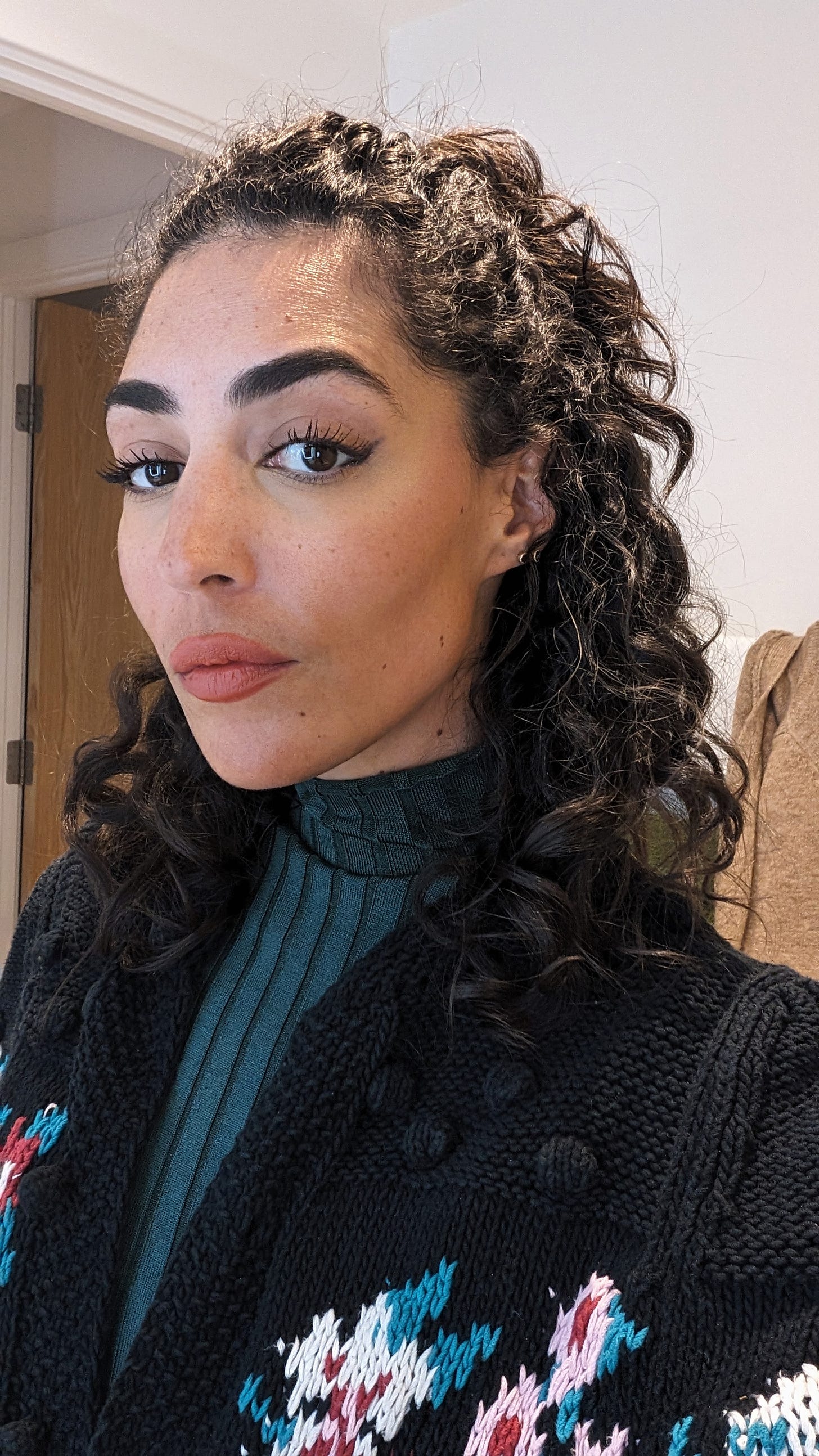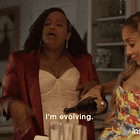I’ve been beefing with my hair since forever. I was not raised to like it as it naturally sprouts from my head.
In my book, The Greater Freedom, I wrote extensively about the fact that, “in a highly gendered Arab culture, there is a profound and all-encompassing emphasis on being ‘well put together’ and a very specific version of what this might look like,” - namely, often Eurocentric beauty ideals, many of which are contrary to what our biology naturally allows.
Some of my earliest memories, then, as I wrote in the book, were of my mum wrestling with my naturally curly hair, trying to blow-dry it into submission, into something she - and the world - considered presentable. Since I can remember, I’ve been doing whatever I can, by whatever sometimes even dangerous methods, to avoid being called “mankoosha” (messy).
But no longer.
My changed, and changing relationship with my hair has been a weird side-effect, an unexpected symptom to witnessing the genocide that’s been taking place in Palestine - a genocide that is being aided and abetted by the West; a continuation of the nakba (catastrophe) they helped set in motion many years ago.
Upon further reflection, then, perhaps it’s not that weird that everything that has happened over the last few months means I am longer buying into the ideals that they have dictated.
Indeed, for centuries, the idea that “the West” is better, more moral, more educated, more beautiful, more civilised, more everything, has been used as justification to invade our homelands. The idea that we are savage, that we are less than, that we are fine to be colonised and enslaved and pillaged because we may look different, because of how our hair coils or curls or - more preferably - does not, because we may do things differently, believe in different things - or whatever perceived difference it may be - has been used as justification for all sorts of the most heinous infringements on human rights. For the most ludicrous creation of hierarchy.
Many Arab countries, including Egypt, have some history of colonisation by the British or the French, which is in part what served to racialise beauty standards - what served to racialise pretty much everything - in the first place.
For those of us who live in ‘the West’, now, then, many are here either as a direct or indirect result of the negative impacts that that plundering and colonisation had on our motherlands - or, because either we or our family members believed these countries, these cultures, when they told us they were better than us. In Egypt, the extent to which people admire the West even has its own expression: Okda el khawaget.
What when we find out that’s not quite true, then?
It’s been months since October 7th, days and weeks and 75 years of watching and protesting and petitioning and crying and fighting with people we had previously thought were our friends, of being told we are terrorist sympathisers - or terrorists ourselves - because we are calling for a ceasefire, for the end of the catastrophic loss of innocent human life.
It’s been months and weeks and 75 years of seeing people somehow argue in the most racist, Islamophobic language that there are no innocent Palestinians, and not be reprimanded at all. Of seeing our friends and colleagues losing their jobs, of getting attacked by Zionists online or in the streets, of being asked for the millionth time Do you condemn Hamas? before we are even allowed to utter a word of grief.
It’s been months and weeks and 75 years of noticing that pretty much the only people speaking out, the only people saying anything, are people that look like us, who come from the same countries or religions as we do, that not even the so-called feminists who made their names being inTeRsEcTiOnAl care enough to want to wade into this.
It’s been months and weeks and 75 years of having to continue to justify our existence, our right to exist and be alive and possibly maybe even thrive if that’s not too much to ask, please, and being heartbroken and dismayed but sadly not surprised when that most basic of human rights is refuted, the goalposts of humanity moved and moved and moved again into the depths of hell. Of being reminded that Brown and Black lives don’t matter as much as white lives do and that even when we’re killed, we are to blame. Even if we straighten our hair like theirs. Even if we speak their languages. Even if we live amongst them. Even if we are the global majority.
No wonder, then, that many of us in the diaspora- myself included - have been rethinking our relationships with the countries in which we live, rethinking the ways in which we have been made to feel less than. No longer believing it.
There was a post that went viral on Instagram and that I haven’t been able to stop thinking about. “You know what else died in Gaza?” it asked. “The myth of Western humanity.”
Indeed, having positioned themselves as more moral, more civilised than the rest, colonising and taking for themselves the role of leaders of the world, in part because of this, calling the rest of us soOoOo violent and backwards and bombing our countries due to the accusations - despite being the ones that brought the world chattel slavery and all the world wars and the worst genocides on the planet to date - it has never been more crystal clear that that is not the case.
“It is curious to see America… looking on herself, first, as a sort of natural peacemaker, then as a moral protagonist in this terrible time. No nation is less fitted for this role,” wrote civil rights activist W.E.B Du Bois.
And now? The West and the weapons it funds and the media it utilises as propaganda and the many other ways it is causing and enabling and supporting this travesty proves, without a shadow of a doubt, that they are on the wrong side of every liberation struggle that there has ever been. That they are not more moral. Not more human than us.
“What is happening is not just a genocide,” wrote one Twitter user. “We are seeing the very institutions of international law and the United Nations crumble into irrelevance - this time maybe forever. The effects of this hypocrisy will be devastating. A new world is being born.”
The truth is, we have seen it now. And we can’t unsee it. We are forever changed. Indeed, it’s clear I’m far from the only one to feel this way, many are dealing with this reckoning in their own individual ways.
It’s been interesting to see the reactions from people when I wear my natural hair in public. To notice how I, myself, feel. Uncomfortable, initially, at times apologetic but, ultimately, free.
As Audre Lorde put it, “the true focus of revolutionary change is never merely the oppressive situations which we seek to escape, but that piece of the oppressor which is planted deep within each of us.”
I continue the work, then, of attempting to decolonise both my mind, and my body, hoping that the damage I inflicted on my hair one day goes away, that my curls come back in full force, and that I increasingly learn what to do with them.
My friend Marina, who has been rocking her gorgeous curls for several years now, made an interesting point when I brought it up with her. Curly hair seems unruly, and so does the woman who wears it, she said. People prefer for us to be manageable. Well, fuck that. That is more than enough of that, now.
Let us be unruly. Let us be untameable. Let us be wild. Let whoever doesn’t like it choke on it.
-Alya xo
Have you had any unexpected awakenings or decolonisings over the last few months? Let me know how, if it all, this has shown up in our life in the comments - or press ‘reply’ to this email to write to me directly.
Amaliah have put together a brilliant resources and activism guide on how to help our brothers and sisters in Palestine. I urge you to check it out and do what you can.
ICYMI:








Thank you for recommending Against the Loveless World by Susan Abulhawa. In equal measures it is stunning and heartbreaking, painfully observed and beautifully written. It feels like important reading.
I love your hair Alya. And I think its entirely true what Marina said: people (men and women) get freaked out by women with funky, curly hair. It challenges them. Cos it has its own life force. And personality. And it doesnt go away. It's just there. Glorious. Just like you.